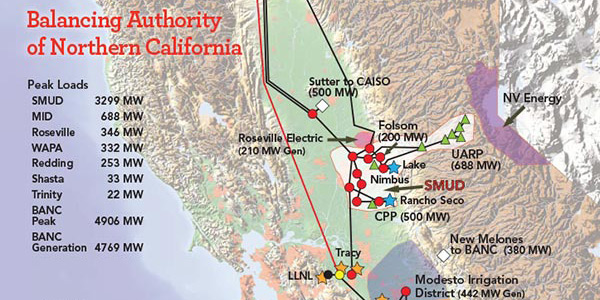By Hudson Sangree
The Western Energy Imbalance Market continued expanding Wednesday as the Sacramento Municipal Utility District (SMUD) became the first publicly owned utility to begin participating in CAISO’s real-time electricity market for the West.
“The Western EIM demonstrates the economic and environmental savings achieved when participants work collaboratively across the region,” CAISO CEO Steve Berberich said in a news release. “As one of the premiere community-owned utilities in the country, SMUD’s participation will only strengthen the market and add to its efficiency and diversity.”
SMUD first announced its intent to join the EIM in October 2016. The nation’s sixth-largest community-owned utility, SMUD also is the largest member of the Balancing Authority of Northern California (BANC). Other BANC members — all publicly owned — may eventually join the EIM. (See SMUD Balancing Area Inks Agreement for EIM Membership.)
“BANC is excited to be the first publicly owned agency to become an EIM entity in the Western EIM,” BANC General Manager Jim Shetler said in the joint statement by CAISO, SMUD and BANC. “We found the CAISO staff to be extremely helpful in assisting us in what was a very smooth transition effort. BANC is currently evaluating future participation by its other members.”
BANC, which began operations in 2011, is the third largest balancing area in California and the 16th largest of the 38 balancing areas in the Western Electricity Coordinating Council. Created as an alternative to CAISO, BANC is responsible for balancing load among its members, as well as coordinating system operations with neighboring balancing areas. BANC contracts with SMUD to perform day-to-day balancing functions.
BANC also serves the Modesto Irrigation District, Redding Electric Utility, Roseville Electric Utility, the city of Shasta Lake and the Trinity Public Utilities District. The BA includes a portion of the Western Area Power Administration’s transmission grid and the U.S. Bureau of Reclamation’s hydroelectric resources in California. The agency’s members control capacity on the California-Oregon Intertie, one of two high-voltage transmission lines linking California with the Pacific Northwest.
In its latest statement of benefits, the EIM said its participants have saved nearly $565 million in the five years since the market started. Shifting electricity from where it’s overabundant to areas that need it has increased efficiency and allowed the growth of renewable resources, proponents contend. (See Sacramento Utility to Join EIM; Other BANC Members May Follow and SMUD to Join EIM in Spring 2019 at the Earliest.)
CAISO says the EIM has cut carbon emissions by more than 324,000 metric tons since its 2014 launch by replacing electricity generated from fossil fuels with energy from wind, solar and hydropower resources.
In addition to CAISO, the EIM’s other members are PacifiCorp, NV Energy, Arizona Public Service, Puget Sound Energy, Portland General Electric, Idaho Power and Powerex. Entities scheduled to begin participation next year include Seattle City Light, the Los Angeles Department of Water and Power and Arizona’s Salt River Project.
Montana’s NorthWestern Energy is planning to join the EIM in 2021. Public Service Company of New Mexico was hoping to join by 2021, but recent regulatory delays have cast doubt on that timing. (See PNM’s Bid to Join Western EIM Gets Approved in Part.)
The EIM serves areas in Washington, Oregon, California, Nevada, Idaho, Wyoming, Utah and Arizona.
“SMUD sees significant financial, operational and resource value in participating in the Western EIM due to its broader regional scope and dispatch,” SMUD CEO Arlen Orchard said in Wednesday’s statement. “The EIM’s geographic diversity allows easier and more economical balancing and integration of intermittent renewable energy resources, helping SMUD meet its and California’s aggressive renewable and carbon-reduction goals.
“SMUD is pleased to have forged this important partnership with the CAISO and the other EIM participants to further these goals.”



